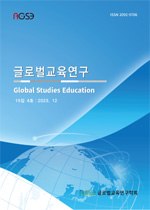- 영문명
- Global Citizenship Education Elements in Elementary Social Studies Textbooks: An Analysis of the ‘Social Change and Cultural Diversity’ Unit in the Korean Nat’l Curriculum 2022
- 발행기관
- 글로벌교육연구학회
- 저자명
- 김지윤(Jiyoon Kim)
- 간행물 정보
- 『글로벌교육연구』제17집 3호, 99~122쪽, 전체 24쪽
- 주제분류
- 사회과학 > 교육학
- 파일형태
- 발행일자
- 2025.09.30

국문 초록
본 연구는 2022 개정 교육과정에 따른 초등학교 3-4학년군 사회과 ‘사회 변화와 다양한 문화’ 단원에 나타난 세계시민교육 요소를 체계적으로 분석하였다. 8종 검정 교과서에서 도출된 371개의 세계시민교육 관련 요소를 UNESCO의 세 가지 학습 영역(인지적·사회정서적·행동적)과 Andreotti의 연성-비판적 세계시민교육 관점을 교차 적용하여 분석하고, 질적 내용분석을 통해 문화 이해의 층위를 도출하였다. 분석 결과, 사회·정서적 영역이 49.6%로 가장 높은 비중을 차지하며 문화적 다양성에 대한 존중과 공감 등 태도·가치 형성에 중점을 두고 있었고, 인지적 영역은 35.3%로 주로 문화의 개념과 다양성에 대한 기초적 지식을 다루었으며, 행동적 영역은 15.1%로 가장 낮은 비중을 보여 실천적 참여의 한계를 드러냈다. Andreotti 관점에서는 전체 요소의 97%가 개인의 태도 변화와 문화적 조화를 강조하는 연성 세계시민교육에 해당했으며, 구조적 불평등과 권력관계를 다루는 비판적 요소는 3%에 불과했으나, 이들 11개 요소가 모두 사회·정서적 영역에 분포하여 3학년 수준에서 비판적 세계시민성이 주로 편견과 차별에 대한 가치 판단 형태로 나타남을 확인하였다. 질적 분석을 통해 문화 이해의 깊이를 표층적, 상호작용적, 성찰적 층위로 구분하였으며, 비록 ‘세계시민’이라는 용어가 명시적으로 등장하지는 않지만 다중적 정체성, 상호의존성, 공동체 의식 등 세계시민성의 핵심 구성 요소들이 발달 단계에 적합한 형태로 배치되어 5-6학년군의 지구촌 학습의 토대를 형성하고 있음을 확인하였다. 본 연구는 초등 저학년 단계에서 세계시민교육의 정서적·가치적 기초가 어떻게 형성되는지를 실증적으로 규명하였으며, 향후 교육과정 개발에서 행동적 영역 강화와 비판적 사고의 초보적 도입, 체험적·참여적 학습 방법 확대의 필요성을 제시하였다.
영문 초록
This study analyzed global citizenship education (GCE) elements in the ‘Social Change and Cultural Diversity’ unit of third-grade social studies textbooks under the 2022 revised Korean curriculum. Analysis of 371 GCE elements from eight government-authorized textbooks using UNESCO's three learning domains and Andreotti's soft-critical framework revealed that the socio-emotional domain dominated (49.6%), emphasizing respect and empathy for cultural diversity, followed by cognitive (35.3%) and behavioral domains (15.1%). From Andreotti's perspective, 97% aligned with soft GCE focusing on individual attitude change, while only 3% addressed critical elements concerning structural inequality, all appearing within the socio-emotional domain as value judgments about prejudice and discrimination. Qualitative analysis identified three layers of cultural understanding: superficial, interactive, and reflective. Despite lacking explicit ‘global citizenship’ terminology, core GCE components—multiple identities, interdependence, and community consciousness—were developmentally appropriate, establishing foundations for upper-grade global issues learning. The findings demonstrate how emotional and value-based GCE foundations form in lower elementary grades and highlight the need to strengthen behavioral dimensions and introduce preliminary critical thinking in future curriculum development.
목차
Ⅰ. 서론
Ⅱ. 세계시민교육의 교육과정 반영과 교과서 구현 양상
Ⅲ. 연구 방법
Ⅳ. 분석 결과
Ⅴ. 요약 및 결론
참고문헌
키워드
해당간행물 수록 논문
참고문헌
최근 이용한 논문
교보eBook 첫 방문을 환영 합니다!

신규가입 혜택 지급이 완료 되었습니다.
바로 사용 가능한 교보e캐시 1,000원 (유효기간 7일)
지금 바로 교보eBook의 다양한 콘텐츠를 이용해 보세요!



